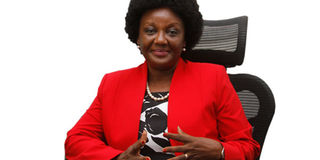Prime
To succeed, women need confidence

Dr Rhoda Wanyenze
What you need to know:
- Inhibition. Dr Rhoda Wanyenze, an associate professor and dean of the Makerere University School of Public Health, says lack of confidence to get on the move or get things done inhibits the growth of women, writes Gillian Nantume.
For someone who believes that women need to have the confidence to succeed in life, Dr Rhoda Wanyenze has walked the talk.
As an associate professor and dean of the Makerere University School of Public Health (MakSPH), she is among a small group of women who have risen to top positions in Uganda’s oldest university.
She attributes this to the previous deans who went out of their way to bring more women into the faculty.
“We need to do better to support women to come up (in their professions) because women can do a great job, are committed, and can deliver,” Dr Wanyenze says.
“But, I think the way we look at things is interesting because when you ask a very capable woman to do something, she will say she is not sure if she can manage it. I have sat on the boards of several organisations and I have witnessed this. Some women are actually very good at what they do but they do not always come out front to acknowledge it,” she adds.
According to Dr Wanyenze, it is this lack of confidence to get on the move or get things done, that inhibits the growth of women. Her go-getter attitude was carefully developed by her father.
“My parents were teachers. Both of them are still alive. Teachers of those days were very strict. My dad always wanted people to work hard, saying people who do not work hard should not eat. He challenged us to achieve; he is the kind of person who thinks you should be the best that you can be and you have to do better all the time. This has inspired me to be more focused and work hard.”
Her father’s advice buttressed her in Senior Five when she was allocated to study sciences, yet she had applied for arts.
“I had always wanted to be a lawyer and I was doing the arts really well. But then, I was also doing the sciences well. When I finished O-Level at Nabisunsa Girls School, I joined Mt St Mary’s College Namagunga but instead of arts, I was given physics, chemistry, and biology. I tried so hard to change the course but it was not easy. So I decided to take up the challenge. Personally, when I am thrown into something, I do the best with it.”
Today, many years later, Dr Wanyenze has no regrets.
Her concession to study sciences, and later becoming a medical doctor, has taken her places beginning in 1993 as a clinician in Uganda Peoples Defense Forces (UPDF).
Her career as a civilian doctor in the army lasted seven years.
She then returned to Makerere University for a Masters degree in public health.
She then joined the MakSPH-CDC Fellowship programme before becoming the founding programme manager of the Makerere University Joint AIDS Programme (MJAP).
After leaving MJAP, she rejoined the MakSPH-CDC Fellowship programme, this time as its leader. From there, she joined the faculty and became the dean of the School of Public Health.
“I am really happy now with the work I have done, because I eventually enjoyed clinical medicine and looking after my patients. Now, I enjoy what I am doing in public health. My field of interest is infectious diseases, such as HIV, tuberculosis, and malaria. I have also done a lot of research with maternal and child health.”
On the challenges of women
Much as confidence is key to women empowering themselves, the mother of five also believes women have not completely overcome biases held towards them.
“Sometimes women are overlooked as leaders. In most cases, it is not intentional. It just happens. You can find yourself being assigned roles of supporting other people to do what they do, instead of being given a leading role. For instance, in meetings a woman is always asked to take minutes, and someone else – often a man – is supposed to chair the meeting. People do not intend to do this; it just happens instinctively.”
One time, Dr Wanyenze found herself in this position. “I found myself offending people when I told them I had been taking minutes for a long time so someone else should do it. They said they asked me to take minutes because I do it so well, but I told them someone else could learn to do it. Why couldn’t I be the one chairing the meeting instead?”
As any successful woman, she has come across men who overlook her professionalism and achievements, and instead wonder how her family is coping.
Once, when she disagreed with someone’s view in a meeting, he called her a ‘bad girl.’
“I do not overplay these instances but I stand up against them whenever they happen. I do not take them to heart or let them deter me. I am not the confrontational type but I believe women should find a nice way to deal with these issues.”
Tomorrow, in Full Woman, read about Brenda Busingye who left the corporate world to start her fashion label, Ambishion


